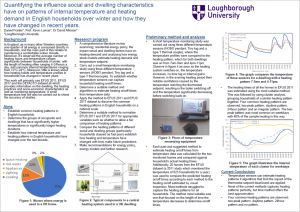Understanding the influence of people and households on the patterns of internal temperature, gas and electricity demand.
- Project Summary
- The Importance of this Research
The 2008 climate change act along with government targets on fuel poverty and energy efficiency have made it crucial to monitor and analyse energy demand and internal wintertime temperatures in English households. Past energy monitoring studies have identified vast differences in internal wintertime temperatures [1] and electricity consumption [2] of households, even when dwellings are near identical [3].
This study seeks to understand the groups of occupants and dwellings that consume significantly more energy, where they use it, and how their energy consumption has changed in recent years. Specific habits of groups will also be explored, for instance, whether occupants living in low-temperature dwellings are comfortable and whether these dwellings have a warmer room. As well as investigating the extent to which groups heat the dwelling when it’s unoccupied.
The project will have a particular emphasis on the 2.5million fuel poor households in England. These are households who would fall below the poverty line, were they to have; a warm, well-lit home, with hot water for everyday use, and the running of appliances. There are severe consequences to leaving people in fuel poverty, with the connection to a higher risk of cardio-respiratory illness. Therefore, additional investigations assessing how fuel poverty is measured, the factors that influence it, and the trade-offs different fuel poor groups make and why will be evaluated.
To thoroughly investigate these matters, the latest energy monitoring dataset will be utilised, namely the 2018 Energy Follow-Up Survey. The 2018 EFUS is currently being carried out by the BRE and is expected to consist of 2,633 households undergoing a detailed interview, with current estimates of 1,000 households having temperature monitoring at 30min intervals, 500 electricity monitoring at 2sec intervals and 300 gas logging at 30min intervals; all for the period from September 2017 to April 2019. The 2011 EFUS will also be used to provide time series analysis based on the temperature and electricity datasets.
The research will increase knowledge of the influence of people and households on the patterns of internal temperature, gas and electricity demand; with results and conclusions being scalable to the national level. The insights gained will assist energy policy formulation, fuel poverty alleviation measures, the design of new controls and heating systems, improved stock modelling accuracy, and evidence about the health of English households.
In particular, to the author’s knowledge, this will be the first research to investigate fuel poverty on a group by group basis using measured temperature and electricity data. Additionally, with this analysis being carried in a time series manner it’s possible to establish if the gap between fuel poor and non-fuel poor groups is widening.
Reference
[1] Kane, T., Firth, S. K., and Lomas, K. J. How are UK homes heated? A city-wide, sociotechnical survey and implications for energy modelling. Energy and Buildings 86 (2015), 817-832
[2] Jones, R. V., Fuertes, A., and Lomas, K. J. The socio-economic, dwelling and appliance-related factors affecting electricity consumption in domestic buildings. Renewable and Sustainable Energy Reviews 43 (2015), 901-917.
[3] DECC, King G, Fell D, 2012, Domestic energy use study: to understand why comparable households use different amounts of energy Final report.



